 For this latest edition of the UCLA Film & Television Archive’s New Chinese Cinema series, we are pleased to welcome the California Institute of the Arts (CalArts) as a partner and to expand the biennial series into a cross-town venture: with Archive screenings at the Billy Wilder Theater and CalArts screenings at the Roy and Edna Disney/CalArts Theater.
For this latest edition of the UCLA Film & Television Archive’s New Chinese Cinema series, we are pleased to welcome the California Institute of the Arts (CalArts) as a partner and to expand the biennial series into a cross-town venture: with Archive screenings at the Billy Wilder Theater and CalArts screenings at the Roy and Edna Disney/CalArts Theater.
The programmatic geography has changed as well—from an exclusive focus on Mainland China to a selection that encompasses Hong Kong and Taiwan, both of whose cinemas the Archive has also presented in years past but in discrete film series. By changing from a territorial framework of “national cinema” to a pan-Chinese, regional one, we recognize not only the transnational movement and exchange of people, capital, ideas and commodities that has been a defining economic and social verity of the formerly “three,” now “two Chinas” for over 20 years (indeed ever since the Deng Xiaoping-orchestrated “opening” of Mainland China to capitalist development in 1978), but also the cultural and historical ties that bind across the divides of Chinese polity.
Hong Kong’s “one country, two systems” reunification with the Mainland is now ten-years-old. A decade prior to 1997, Hong Kong New Wave director Ann Hui made news by shooting The Romance of Book and Sword (1987) on location in Mainland China. Fast forward two decades and Hui’s wonderfully tragic-comic The Post-Modern Life of My Aunt is one of a number of mainstream box-office successes to feature mixed casts of Hong Kong (Chow Yun-fat) and Mainland stars (Siqin Gaowa).
Low-cost digital cameras meanwhile have fueled the rise of independent Mainland Chinese auteurs far from the traditional filmmaking hub of Beijing. In this post-Sixth Generation era, China’s provincial heartland has made a comeback onscreen with a grim industrial vengeance, shorn of any allegorical cloaking in the feudal past, as the Fifth Generation films set in rural China were wont to do. Be it mercenary calculation substituting for blood relations in the astounding Little Moth, or the mobster travesty of village governance in Trouble Makers, Mainland China’s independent cinema remains insistently in the present.
Oddly enough this cinema’s penchant for deep focus shots, long takes and documentary-inflected realism—evidenced in the work of renowned Sixth Generation filmmaker Jia Zhangke (Still Life, Dong and Ten Years)—mark it if not as the stylistic heir to the New Taiwan Cinema, then certainly as the earlier movement’s spiritual kin.
Alas, Chinese cinema lost one of its keenest chroniclers of modernity and the rapid social transformations experienced in the region in recent years with the passing this July of the New Taiwan Cinema master Edward Yang. On October 19, we pay homage to his memory with the revival screening of the director’s cut of his masterpiece, A Brighter Summer Day.
7:30 p.m. •please note screening at 9:40 p.m.
Los Angeles Premiere STILL LIFE (SAN XIA HAO REN)
STILL LIFE (SAN XIA HAO REN)
China/Hong Kong, 2006
dir/scr: Jia Zhangke. prod: Xu Pengle, Wang Tianyun, Song Jing. cin: Yu Likwai. art: Liang Jindong, Liu Qiang. ed: Kong Jinlei. mus: Lim Giong. cast: Zhao Tao, Han Sanming, Wang Hongwei, Lan Zhou, Huang Yong, Peng Jianlin.
Awarded a Golden Lion at the 2006 Venice Film Festival, Still Life entertains with Dong the same relationship as Unknown Pleasures (Ren Xiao Yao, 2002) does with In Public (2001). In both cases the architecture and layout of public spaces (and in Still Life/Dong, their ruins) function as a metaphor for the mental state of fictional characters; in both cases the documentary came first. Before leaving for the Three Gorges Dam where he intended to paint giant portraits of migrant workers, the painter Liu Xiaodong had invited Jia to come and make a documentary about his work. Jia recalls: “the reality brought me into a trance… as I was looking at the ruins left after the dismantling and the lands that were to be submerged and the soaring new towns in the distance… When shooting…the documentary, looking through the viewfinder and watching the people… I started imagining their lives outside the scene.”
While most people are forced to leave Fengjie, Jia unfolds the intertwining (yet never intersecting) stories of two people who arrive in the soon-to-be-flooded city. A coal miner from the countryside (Jia’s cousin, Han Sanming), finds a job as a demolition worker so he can stay in the area to look for his estranged wife, a former runaway child bride. Or is he staying to be reunited with his grown-up daughter? A sophisticated young nurse from Shanxi (Jia’s homegrown star, Zhao Tao) enlists the help of an archeologist (Wang Hongwei, the eponymous Xiao Wu) to locate her elusive engineer husband. Is it because she misses him or does she have another agenda?
Undoubtedly aware that the relationship between documentary and fiction that haunts his work has reached a new level of crystallization, Jia expressed the wish that Still Life and Dong be shown together. We are proud to be able to present such an event.
35mm, Chinese w/ English subtitles, 108 min.
*NOTE: Separate admission required for the 9:40 p.m. screening of Dong.
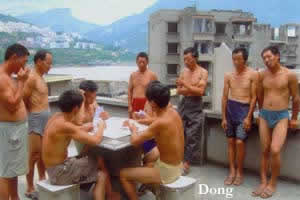 Friday, October 5
Friday, October 5
9:40 p.m. •special time
U.S. Premiere
DONG
China, 2006
dir: Jia Zhangke. prod: Yu Lik-wai, Zhu Jiong. cin: Yu L.W., Jia Z.K., Chow Chi-sang, Tian Li. ed: Kong Jinlei, Zhang Jia. snd: Zhang Yang. mus: Lim Giong. cast: Liu Xiaodong.
Known in the international art market for his monumental, fractured paintings, Liu Xiaodong (nicknamed “Dong,” which also means “East”) is known to lovers of Chinese cinema for having starred in a fictionalization of his own life in Wang Xiaoshuai’s The Days (Dongchun De Rizi, 1993). He was also the art director for Zhang Yuan’s Beijing Bastards (Beijing Zazhong, 1993), and had a cameo in Jia’s The World (Shijie, 2004). Planning a diptych called “Hotbed,” Liu invited Jia to make a documentary about his working process. The first volet took the painter and the film crew to the Three Gorges area, as demolition workers were coming from all over China, living in precarious conditions, to tear down the towns and cities soon to be flooded by the construction of the dam.
Profoundly moved by the site, Jia imagined a new fiction film—Still Life—to take place in that location, shot both the documentary, Dong, and Still Life at the same time, slightly fictionalizing the documentary (Still Life actor Han Sanming became a sitter for Liu and ended up in one of his paintings), while anchoring the reality into the fictional narrative. Later Jia followed Liu as he worked on the second volet—the portrait of another marginalized population, young female sex workers in Thailand. A shot of Liu on the boat sailing the Yangtze cuts to another of him on the Mekong.
While crafting the complex, fascinating portrait of a major Chinese artist at work, Jia raises haunting questions about the relationship between art and reality, and the intertwining of fiction and documentary that is at the core of his oeuvre. He wanted to show Dong and Still Life together. We are happy to fulfill his wish.
HD Cam, Mandarin w/ English subtitles, 70 min.
*NOTE: Separate admission required for the 7:30 p.m. screening of Still Life.
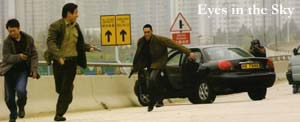 Saturday, October 6
Saturday, October 6
7:30 p.m.
U.S. Premiere
EYE IN THE SKY (GUN CHUNG)
Hong Kong, 2007
dir: Yau Nai-hoi. scr: Au Kin-yee, Yau N.H. prod: Johnnie To, Tsui Siu-ming. cin: Cheung Tung-leung. art: Raymond Chan. ed: David Richardson. mus: Guy Zerafa. cast: Tony Leung Kar-fai, Simon Yam, Kate Tsui, Lam Suet, Maggie Siu.
The films produced by Johnnie To’s Milky Way Company are fascinating studies of the topography of Hong Kong Island, the mean streets of Kowloon or the falsely quaint hide-outs of Macau. For his directorial debut, Yau Nai-hoi, the noted screenwriter of PTU (2003), Running on Karma (2003) and Election (2005), explores the intricate maze of the Central area of Hong Kong with the love and intimate knowledge of a native son. Through his skilled mise en scène, this cluttered urban texture becomes a series of signs to be deciphered: every street corner, every small event, every step out of line, is pregnant with hidden meaning and possible menace.
And the cops of the Surveillance Unit (SU—code name: “eye in the sky”) aren’t the only ones on the look-out. Master criminal Shan (Tony Leung) is as adept at reading signs and outsmarting his opponents as is ace cop “Dog Head” (Simon Lam). The outcome of this suspenseful cat-and-mouse game will eventually depend on who leaves traces, who does not, and who can turn an image into a clue. Shan pays for his MTR (subway) entrance with small change to leave no record of his wanderings, while one of his not-so-smart acolytes (Lam Suet) buys junk food at his local 7/11 with the omnipresent “Octopus card”—a rechargeable “smart card” that denotes Hong Kong modernity, but whose transactions can be traced by computer. Meanwhile, Dog Head’s rookie-in-training (Kate Tsui), a little taken aback at being given the code name “Piggy,” quickly masters the tricks of the trade: from taking pictures of a suspect with her cell phone and tailing a gangster while passing as a helpless female, to disregarding orders from headquarters—in the grand tradition of any self-respecting cop movie. A treat for the eyes and the mind!
35mm, Cantonese w/ English subtitles, 90 min.
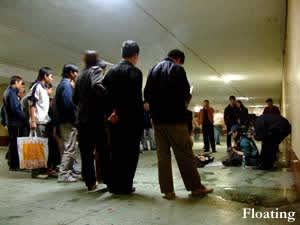 Sunday, October 7
Sunday, October 7
7 p.m.
Los Angeles Premiere
FLOATING (PIAO)
China, 2005
dir/cin/ed: Huang Weikai. snd: Lao Ma, Huang W.K. cast: Yang Jiwei.
Yang is a longhaired, alt-rock street musician in Guangzhou, a charming slacker who espouses a languorous attitude towards his music, his girlfriends and the cops. More often than not lounging on his back like a leather-jacketed odalisque—on the scraggly grass of an urban park or propped against his Teletubbies bedframe—Yang speculates about how to retrieve his confiscated guitar from the Urban Management Bureau, coaches his buddies on how insulting a girl is the best way to keep her, and plots elaborate pranks on the local police involving calls to the suicide hotline.
But Yang’s nonchalance masks defiance. Like millions of other rural migrants to China’s urban centers, Yang could be summarily arrested and deported at any moment in accordance with the “Regulation on the Detention and Repatriation of Vagrants and Beggars in Cities.” The 1982 law lays bare the flagrant disparities of China’s economic miracle, where burgeoning cities have become Meccas to a displaced rural underclass. With glorious intimacy, Huang Weikai’s oblique documentary camera captures the contradictions of this hipster anti-hero who saunters dangerously through a “sleepwalking” existence, at the mercy of a government he refuses to take seriously.
DVCam, Mandarin w/ English subtitles, 93 min.
U.S. Premiere
BETELNUT (BINGLANG)
China, 2006
dir/scr/cin: Yang Heng. prod: Zhu Rikun. ed: Tian Kun. mus: Wu Jun. cast: Tian Li, Liang Yu, Wu Ming, Dai Qi.
One hot summer in a small southern town by a river, two young loafers idle away their time stealing mopeds, frequenting internet cafes, singing drunken karaoke with the boys, getting into scrapes with other boys, hanging out on a river barge and falling in love. The objects of their desire are two young women, both of whom eventually prove to be “unattainable” because one already has a boyfriend and the other harbors a yen to leave the provinciality of Hunan for the bright lights even further south in Shenzhen. Echoing I Vitelloni—Betelnut’s setting is a town bounded by water that is also the filmmaker’s hometown—by way of Jia Zhangke, this gently observational portrait of youthful aimlessness also displays a precision of composition and pacing startling for a first feature.
DVCam, Mandarin w/ English subtitles, 112 min.
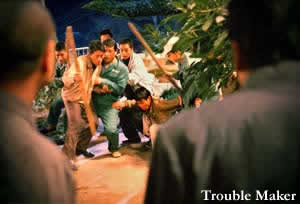 Wednesday, October 17
Wednesday, October 17
7:30 p.m.
West Coast Premiere
TROUBLE MAKERS (GUANGRONGDE FENNU)
China, 2006
dir/scr/edit: Cao Baoping. based on “Village Operation” by Que Diwei. prod: Zhang Yaoli, Cao B.P., Cindy M. Li. cin: Tao Shiwei. art: Lou Pan. cast: Wu Gang, Li Xiaobo, Kong Qingsan, Wan Yanhui.
A backwater hole of a village, appropriately called Blackwell, is under the thumb of the four Xiong Brothers, who are salt traffickers, rapists, corrupt officials holding a monopoly on power in the village and relentless profiteers. Promoted to be the local Party Secretary so he can be the brothers’ fall guy, Ye Guangrong smiles to their face, but is seething inside. (The Chinese title is “Guangrong’s Fury,” and the original English title was “The Glorious Fury.”) Unable to fight this new “Gang of Four” through official channels, he assembles a colorful posse of riff-raff, thugs, coarse peasants and honest villagers who are simply fed up. And then they start to fight dirty. Really dirty.
It’s a men’s story (women are kept in the background, mostly as victims), with an accompanying deluge of insults, foul language and obscenities—a rare and fascinating instance in Chinese cinema. One of the thugs, who’s enamored with kung fu, that Guangrong recruits into his rebel militia is known by the sweet monicker of “Dog Balls.” The film is suffused with a Rabelaisian poetry of vulgarity and joyful playfulness, but also a somber streak—as tragedy, limited horizons and backward sexual politics keep seeping under the humor, in a way that brings to mind the Jim Thompson of The Killer Inside Me or Pop 1280.
In spite of its happy ending, this dark comedy had to wait a long time before being approved by the censors. Unrest in the countryside, villager riots, peasant revolts—these are current Chinese realities that the powers-that-be don’t like to talk about. For his first feature, screenwriter-turned-director Cao Baoping demonstrates an absolute mastery of the medium, with a rigorous mise en scène that produces a claustrophobic feeling, uncanny for a depiction of the countryside. The acting is excellent, especially Wu Gang as Guangrong, a first-rate actor too often underestimated.
35mm, Mandarin w/ English subtitles, 103 min.
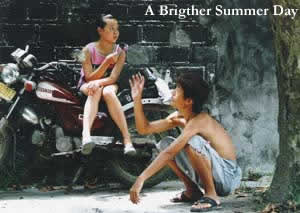 Friday, October 19
Friday, October 19
7:30 p.m.
A Tribute to Edward Yang
A BRIGHTER SUMMER DAY — Director’s Cut
(GULING JIE SHAONIAN SHA REN SHIJIAN)
Taiwan, 1991
dir: Edward Yang. prod: Yu Weiyan. scr: E. Yang, Yan Hongya, Yang Shunqing, Lai Mingtang. cin: Zhang Huigong. art: Yu W.Y., E. Yang. ed: Chen Bowen. cast: Lisa Yang, Zhang Zhen, Zhang Guozhu, Elaine Jin.
Born in Shanghai in 1947, Edward Yang moved with his family to Taiwan as a little boy. After studying engineering in the U.S., he became, with his colleague Hou Hsiao-hsien, one of the founders and luminaries of the “New Taiwan Cinema” of the 1980s that marked a renaissance in the country’s culture. As Hou focused more on small towns and the countryside, Yang became the poet of the tremendous changes undergone by Taipei. He had a keen eye for discovering talent. He gave Chris Doyle his first job as a DP on That Day on the Beach (1983), Yang’s own first feature. Later, as he was preparing A Brighter Summer Day, he cast and trained a 13-year-old teenager, Zhang Zhen, who reappears in his later film, Mahjong (1996), and, as “Chang Chen,” became internationally famous for his roles in Wong Kar-wai’s Happy Together (1997), Ang Lee’s Crouching Tiger, Hidden Dragon (2000) and Tian Zhuangzhuang’s The Go Master (2006). Inspired by the story of a murder committed by one of Yang’s schoolmates, A Brighter Summer Day (1991) is considered the director’s magnum opus. We are grateful to the Yang family for allowing us to organize this screening of the rarely shown director’s cut of the film.
In the 1960s, Taipei, though semi-rural, is struggling with a rapidly advancing modernity. Kids listen to Elvis Presley and join street gangs. Between them and the generation of their parents—displaced by the Chinese civil war and the Kuomintang’s retreat to Taiwan—lies a tragic gap that only emotional excess and violence can fill… Young Si’er falls hard for Ming, a lovely, endearing and complex girl of “questionable” reputation who happens, alas, to “belong” to the leader of a rival gang. More Carmen than Romeo and Juliet, the film is also that rare authentically tender representation of ill-fated teenage love.
35mm, Mandarin w/ English subtitles, 237 min.
*Introduced by John Anderson, film critic and author of “Edward Yang” (2005) Saturday, October 20
Saturday, October 20
7:30 p.m.
U.S. Premiere
LITTLE MOTH (XUE CHAN)
China, 2007
dir/scr/edit: Peng Tao. prod: Peng T., Zeng Wenwen. cin: Huang Yi. art: Hu Qingsheng. cast: Hong Qifa, Han Dequn, Zhao Huihui, Zhang Lei.
“I found a girl for you,” says Uncle to his nephew Luo Jiang. “She’s 11-years-old. She can’t walk.” Luo pays 1,000 yuan ($125) for her so she can be used to beg in the street. Begging is a trade like any other—with its own rules, territories and rackets—and this is what the artificial family formed by Luo, his wife Guihua and Xiao Ezi (“Little Moth”) does for a living. “I wanted to show the unique status of people living at the bottom of the Chinese social ladder,” says first-time director Peng Tao, who spent weeks in the mountains of Hubei Province, selecting non-professional actors from whom he extracts sober, compelling performances. His restrained, semi-ethnographic style that calls to mind Hou Hsiao-hsien’s first movies suggests more than shows, and unfolds the complexity of characters who may be “rough” and “uncouth,” who don’t speak much, but communicate through daily gestures (cooking, sharing food or drinks, dressing up poor lodgings). The “exploiters” are themselves disenfranchised, marginalized people who, in their never-ending struggle for survival, don’t have the opportunity to question the ethics of what they are doing. Guihua displays unexpected signs of affection for Xiao Ezi; the boorish Luo shows real emotion when his wife is missing. On the other hand, “nice” rich people reveal, under the social veneer, their indifference and cruelty.
The children are splendid: neither “cute” not obnoxious, and often silent because they don’t have a say about their own fate. Yet the mise en scène makes us share their vision of the world. We sympathize with the soulful eyes of a boy who realizes he is no longer wanted. And, for a haunting moment, we share the gaze of a little girl staring at the off-screen void.
DigiBeta, Mandarin w/ English subtitles, 99 min.
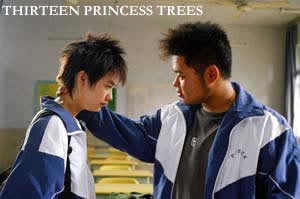 U.S. Premiere
U.S. Premiere
THIRTEEN PRINCESS TREES (SHISANKE PAOTONG)
China, 2006
dir: Lu Yue. scr: Ying Liu, Lu Y., based on “Blade vs. Blade” by He Dacao. prod: Chris Liu, Wang Qingyong, Hao Jiangguo. cin: Xu Wei. art: Zhao Anqi. ed: Yan Tao. mus: Liu Suola. cast: Liu Xin, Zhao Mengqiao, Duan Wenbo, Wang Jing, Zhong Ping.
This bracing look at a year in the lives of a group of high-school delinquents refreshingly features a teenage girl at the center. Feng has trouble at home. Her parents are divorced. Her mother is absent from her life and her father works long hours as a security guard and is embittered. Feng runs with the tough crowd at the titular school. When a new boy transfers from Lhasa, he seems at first to be a roughneck out to intimidate his way to the top of the Princess Trees heap. But the film turns ever so delicately on Feng’s change of perspective—the gradual shift of her sexual interest away from the handsome, homegrown gang leader to the pugnacious outsider, whom she comes to see as a kindred soul desperate for love. Lu Yue whose directorial debut Mr. Zhao was screened at the Archive’s New Chinese Cinema series in 2000 is also an accomplished cinematographer, best-known for his work with Zhang Yimou on Shanghai Triad, Joan Chen on Xiu Xiu: The Sent-Down Girl, and now, John Woo, on the forthcoming Red Cliff.
35mm, Mandarin w/ English subtitles, 98 min.
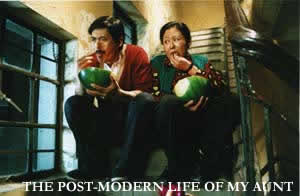 Friday, October 26
Friday, October 26
7:30 p.m.
West Coast Premiere
THE POST-MODERN LIFE OF MY AUNT (YIMADE HOUXIANDAI SHENGHUO)
Hong Kong/China, 2006
dir: Ann Hui. scr: Li Qiang, based on a novel by Yan Yan. prod: Er Yong. cin: Kwan Pun-leung, Yu Lik-wai. art: Wu Lizhong. ed: Liao Ching-song. mus: Joe Hisaishi. cast: Siqin Gaowa, Chow Yun-fat, Vicky Zhao Wei, Lisa Lu.
In her most radical character study of a woman to date, Ann Hui keeps a fine balance between absurdity, slightly grotesque situations and moments of melancholia to enter the mind of her protagonist. Educated, proper, pristine Ye Rutang (masterfully played by Siqin Gaowa, who does not shy away from adding a few years to her real age) tries to maintain a façade of respectability and kindness, while working hard to make a living. Her Oxford-accented English is no longer in demand with the parents of the kids she tutors, her sense of ethics is constantly violated by the holier-than-thou airs of her hated neighbor, Mrs. Shui (Lisa Lu), and then she meets with a series of tragic-comic mishaps that precipitate her downfall. The most “scandalous” aspect of the story lies in the heroine’s dalliance with the mustached Pan Zhichang, symbolized in the film’s publicity by a shot of Siqin Gaowa and Chow Yun-fat in bed, smiling. At long last a Chinese film depicting an older woman’s sexuality and her relationship with a younger (and charming) man!
Yet in Hui’s skilled hands, things are not always what they seem. The expected “love affair” between these two paragons of contemporary Chinese cinema occupies a rather brief amount of screen time and is shown as a collage of funny or embarrassing moments. And, first perceived as a harmless “auntie” lost in the shuffle and bustle of Shanghai modernity, Mrs. Ye becomes a victim of her own recklessness as well as the callousness of others—before her true identity as a bad mother and ultimately an orphan of Chinese history slowly emerges. It is definitely “[Hui’s] best made-in-China film yet.” (Tony Rayns)
35mm, Mandarin w/ English subtitles, 110 min.
http://www.cinema.ucla.edu/
310.206.FILM

